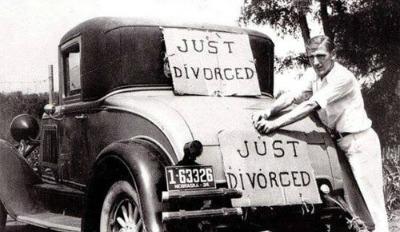Posts by Dr. Karen Finn
What Makes Gray Divorce Especially Difficult
Unlike divorces that happen earlier in life, it’s not the kids.
Every divorce is full of challenges, frustrations and problems. But gray divorces (those that occur when people divorce in their 50s and beyond) has a unique set of issues.
Most couples who divorce later in life are empty nesters. Their kids are out of the house and living their own lives.
You could say this simplifies a gray divorce because you don’t have to worry about child custody or child support or visitation. (But just because the kids are out of the house that doesn’t mean they won’t have difficulty with their parents’ divorce.)
But this seeming simplification for gray divorce is offset by a major complication – retirement.
When you’re over 50 and divorcing you’re at most 15-20 years from retirement. And all those retirement plans you’ve been making for the decades you’ve already been working? They dissolved along with your marriage.
It’s this decreased time to recover financially from divorce that makes gray divorces so challenging.
So what do you do? You think carefully about every decision you make.
After years of marriage, a couple’s shared assets are much greater and probably more complicated than those of couples who have shorter marriages. And the division of these assets impacts lifestyle not only immediately upon divorce, but also into retirement because of the relatively short timeline before retirement.
For example, when younger couples divorce, their marital home is usually their largest joint asset and can fairly easily be dealt with during the divorce. What often happens is that one spouse will buy the other out by refinancing the mortgage or even taking out a second mortgage.
But when a couple who’s closer to retirement decides what to do with the marital home the option to buy out the spouse is less likely because the long-term earning potential necessary to carry a second note on the home just isn’t there. As a result, the house is typically sold and both former spouses downsize – and downsize a whole lot more than their original retirement plan called for.
In the US another major challenge for gray divorcees (especially for those who have been a stay-at-home parent) is healthcare coverage until they qualify for Medicare. Many choose to use COBRA so they can continue the same healthcare coverage they’re used to, but the rates are often quite high which takes a chunk out of any spousal support they may be receiving.
And paying spousal support many years into the future, especially when those years occur after retirement, can be very difficult for the primary breadwinner.
Finally, many people who divorce after 50 worry about being alone for the rest of their lives. This makes recovering from divorce that much more difficult because these people begin to wonder what there is to look forward to. The end result is that they lose hope more easily than those who divorce when they’re younger and are at higher risk for getting stuck in their divorce recover efforts.
However, even with the extra challenges of gray divorce, more and more people 50 and older are divorcing. Some are divorcing because they’ve stuck it out for the kids and are ready to begin living their lives for themselves again. Others are ending their marriages simply because they don’t want to continue living their lives as they have been.
Regardless of what triggers a gray divorce and the challenges a divorce at this time of life brings with it, the truth of the matter is that divorce is a life transition and your life after divorce will be what you make of it – just like every other life transition you’ve already experienced.
Looking for more tips on how to deal with your gray divorce and move on with your life? You’ll find what you’re looking for in Life After Divorce.
I’m Dr. Karen Finn, a divorce coach and advisor helping people just like you who are wondering how to make their life work during and after divorce. You can join my newsletter list for free weekly advice. If you’re ready to take the first step toward working with me as your personal coach, you can schedule an introductory private coaching session.
This article was originally published at DivorceForce.com.
Stop Blaming Your Ex And You’ll Start Getting Over Your Divorce
The longer you blame them, the more you’re hurting yourself.
There are tons of reasons why people blame their ex for their divorce. Among the more common reasons are giving up, unwilling to work on saving the marriage, too argumentative, and unrealistic expectations.
And these are wholly justifiable reasons for feeling angry and hurt about your ex taking your dreams of celebrating your 50th anniversary together and grinding them to dust without an ounce of remorse.
However, if you continue to focus on blaming your ex you’re only hurting yourself (and your kids).
Getting over divorce requires a lot of things including that you get over blaming your ex.
By continuing to blame your ex for the end of your marriage, you’re making your divorce more contentious. The increased friction has three main effects. First, all the arguing makes coming to a settlement take a whole lot longer. Second, you’ll wind up paying more for your divorce. Finally, getting over divorce is pretty difficult if your divorce is still going on.
All the blame you’re heaping on your ex-spouse for breaking up your family negatively impacts your kids. Sure, breaking the family up in the first place hurts your children, but by continuing to find fault with their other parent isn’t making things any better.
In fact, it’s keeping you from figuring out how to co-parent well. And the longer it takes the two of you to figure out the whole co-parenting thing the more damage you’re both doing to your kids.
It takes a lot of energy to continue blaming your ex for shattering your dreams of happily ever after. You could say that it’s providing you the fuel to get through the divorce. But that wouldn’t be true.
The truth is that the longer you continue placing all the blame for the end of your marriage squarely on their shoulders, the longer you’re allowing them to hold you as an emotional hostage. You’re abdicating responsibility for yourself and making it impossible to get over your divorce.
In order to get over your divorce you have to do x things. You have to accept what’s happened and that your marriage has ended. You have to acknowledge the torrent of emotions you’re experiencing. And you have to take responsibility for you and work on getting over your divorce.
No one can do any of this for you – no matter how much you blame them; the blame will never make you feel better or allow you to create a new chapter of your life.
The longer you choose to focus on the blame the more you’re focusing on the past and it’s damn hard to move forward when you’re looking backward. You have to focus on what you can do to move yourself forward (as scary as that is).
And that’s the secret of getting over divorce: focus on what you can do now to truly change your situation for the better regardless of what your ex did or didn’t do.
I’m Dr. Karen Finn, a divorce coach and advisor helping people just like you who are struggling with getting over divorce. You can join my newsletter list for free weekly advice. And if you’re interested in taking the first step toward working with me, you can schedule an introductory private coaching session.
Looking for more support and ideas for getting over divorce? You’ll find what you’re looking for in Dealing With Grief.
A Little Emotional Detachment Could Save Your Unhappy Marriage
Use a little emotional detachment to prevent fights with your honey from destroying you.
We’ve all had them – those epic battles with our spouse that leave us shattered and questioning why we’re still with them.
As much as you dreamed of your marriage being different (and maybe even better) than those marriages you observed growing up, the reality now is that your marriage is pretty much the same as those other ones. The rosy glow of new love has worn off and you’ve discovered that your road to “happily ever after” has a few pot holes in it.
Yeah, pot holes are a euphemism for those epic battles that seem to be part and parcel of your marriage.
Fights between a married couple are so horrible at times for four big reasons.
- Spouses know each other better than anyone else. Remember when you first fell in love and would spend hours talking? Well, that’s how you first got to know each other so well. Then as you spent more and more time together you learned more and more about each other.This deep familiarity between the two of you makes every argument more hurtful because of the underlying assumption of trust to care for each other above everything else.
- Spouses trust each other with just about everything. This trust which permeates your entire relationship gets thrown into question each and every time you have a fierce argument. You begin to wonder not only if you can really trust them, but if you can continue to trust yourself for picking them to be your spouse in the first place.
- Spouses live together. Unless you’ve got a long-distance marriage you’re with each other a lot. There’s no running off back to your place to cool down after a fight because you live together. You share a home and probably a bedroom.This closeness works well when things are going well, but when things go poorly this togetherness can make it extremely difficult to recover from a battle.
- And spouses tend to trigger each other’s sensitivities. You have wounds from the past – just like everybody else does. Sometimes events in the present can trigger hurt from the past.Once your spouse triggers your past hurt, it’s present right now demanding that you deal with it. (If you have a tendency to feel abandoned, alienated, dependent, emasculated, empty, enmeshed, helpless, inferior, insignificant, patronized, powerless, rejected, subordinate, used, weak or worthless when you and your honey argue, then you know exactly what I’m talking about.)
The intimacy and trust you’ve developed over the years combined with the fact that you’re human can make it really hard to separate yourself from your spouse. When things are going good that closeness is great! But when things aren’t going so well, your battles can leave you feeling devastated.
The best thing you can do to prevent the typical aftermath of pain from your arguments is to practice a little emotional detachment.
“A little” is key here. You don’t want to detach from your spouse, you just want to add some space between you and your emotions when a battle is underway.
One of the easiest ways to add a little space is to remember that whatever your honey is saying is more about them than it is about you. And that’s true even if they’re saying (or yelling) horrible things about you.
Whenever your spouse states something it’s coming from their point of view which includes their perceptions, their assumptions, their understanding, their beliefs, and their emotions. It’s all about them. You might believe they’re completely wrong, but remember that’s from your point of view (which, by the way, does include all of your perceptions, assumptions, understanding, beliefs and emotions).
So instead of becoming embroiled in the battle, you can become curious about what they’re saying. Once you’ve acknowledged their statement and emotion, you can choose to ask clarifying questions in an effort to understand why your spouse is saying what they’re saying. By doing so, you’ll automatically be practicing a bit of emotional detachment.
Another simple way to separate yourself from the battle so you don’t leave it feeling destroyed is to remember that your spouse is human too – despite the transformation that usually occurs when you argue with them.
Their anger could easily be covering up one of their sensitivities (abandonment, alienation, dependence, powerlessness, emasculation, emptiness, helplessness, insignificance, worthlessness, etc.) that you’ve accidentally triggered.
By remembering that they’re a sensitive person too (as hard as that might be to believe at times), you can become emotionally detached from the hurt you feel when they lash out. That doesn’t mean you have to accept the lashing, it just means you don’t have to take it to heart.
Arguments with your spouse hurt so much is because you’re physically and emotionally close to each other – you’ve got a connection. And like everything else in life your connection is both positive and negative. The positives of your connection are obvious. The negatives include the devastation you feel in the aftermath of an argument.
By selectively choosing to practice a little emotional detachment the next time you find yourself in the beginnings of an epic battle, you’ll be able to avoid some of those potholes on your road to “happily ever after.”
I’m Dr. Karen Finn, a divorce and personal life coach helping people just like you who are struggling with their marriage and aren’t sure they can turn things around. You can join my anonymous newsletter list for free weekly advice. And, if you’re ready, you can take the first step toward working with me as your personal coach by scheduling a private consultation.
Looking for more support and ideas for making your marriage better? You’ll find what you’re looking for in Unhappy Marriage.
How To Deal With Losing Your Friends (And Making New Ones) Post-Divorce
Despite the painful losses, it’s easier to make friends post-divorce than you might think.
There are so many things you lose when you get divorced. Obviously, there’s the marriage, your role as spouse, being with your kids every day and maybe even your home.
But there’s one loss that surprises just about everyone – the loss of your friends. They probably won’t all leave in some grand exodus. But it’s common for them to start fading away one or two at a time.
Now you probably aren’t surprised by losing the friendship of your in-laws or even the friends that your ex brought into your life. After all, most people feel like they have to take sides in a divorce and loyalties tend to go with blood and duration of relationship. Not always, but usually.
Unfortunately, you’ll probably lose other friendships too. It’s likely that over time you’ll lose many of your married friends. This happens for many different reasons. Some will see you as a threat to their marriages and decide that spending time with you isn’t a good idea. Others you’ll lose because of a decision you’ll make. As time goes on, you’ll likely become tired of being a third wheel.
Then there are those that just seem to evaporate for no real reason. These friends who may have been there to support you through other trials and tribulations disappear now without a trace.
Their disappearance is usually because they don’t know what divorce is really like because they’ve never been through one. They don’t know what the proper social expectations are for helping a friend through the end of a marriage either.
And so these people bail. Says a lot about them. Doesn’t it?
The logic is there to help you understand why these friends have left your life when you really need them. But it doesn’t help with the pain their disappearance causes. The loss of friendships is especially difficult during divorce because it’s yet another loss on top of the huge mound of losses you’re already experiencing.
Sometimes understanding the reason helps lessen the pain, but you still need to mourn your lost friendships. And one of the easiest ways to work through the mourning on your own is to write a goodbye/hello letter.
This is a letter that you never send. And it does two things. First, it will allow you to express your grief about losing the friendship. Second, so you don’t get stuck in the grief, the letter will provide you a means for acknowledging what is still good in your life. (And, yes, there is still good in your life.)
The interesting thing is that once people have left your life, you have room in your life to both deepen your remaining relationships and create new ones. Now I know the idea of finding new friends probably isn’t something that has you jumping up and down with glee right now, but I promise that you can do it (and fairly easily too).
When I got divorced, I made some amazing friendships with people (both women and men) in my divorce support group. It was kinda like the two birds with one stone idea. I needed to heal from my divorce and I needed friends. And everybody else in the group needed the same thing.
If you’re not already participating in one, find a divorce support group and get involved. You won’t find friends if you’re just a fly on the wall. You’ll need to participate and find commonalities with one or two other people in the group so you can support each other through your healing and develop friendships.
The other really easy way to find friends is to participate in Meet-Up groups. Don’t worry. I’m not suggesting that you find singles’ groups to join. Instead look for groups that are doing things that you find interesting. Maybe it’s a book club, or a hiking group, or an adventure group, or even a knitting group. The key is to get involved in things that are fun. When you’re having fun, it will be easy to strike up conversations with the other people who are having fun too.
One last word here about making new friendships. Please don’t feel that you can only befriend people of the same sex. Allow yourself to develop friendships with people of the opposite sex is very helpful for learning to trust again and is a great stepping stone for getting out there and starting to date again – when you’re ready (and if you decide that’s what you want to do).
So even though it’s heartbreaking to lose friendships along with everything else when you get divorced, it’s OK. The ones who stick around are real friends. And the good news is that you can make new friends by doing things that help you heal and that are simply fun.
I’m Dr. Karen Finn, a divorce coach and advisor helping people just like you who are struggling with divorce. You can join my newsletter list for free weekly advice. And if you’re interested in taking the first step toward working with me, you can schedule an introductory private coaching session.
Looking for more help making sense of all the changes happening because of divorce? Read more advice in Dealing With Grief.
This article originally appeared on DivorceForce.
How To Be Happy As You’re Healing After Divorce
By using these three keys one after the other, you’ll find happiness again.
The pain of divorce is unrelenting. And understandably so because your world has crumbled to dust.
The one person who promised they’d love you forever is gone and replaced by a stranger who only looks like your ex. The home you shared together is either horribly empty or gone. And seeing your children wake up every morning and putting them to bed every night is also gone.
Every single one of the losses – both big and small – pulls at your soul so hard that it’s difficult to think, breathe or, at times, simply exist.
Yet as painful as healing after divorce is, happiness is still available to you. You probably won’t feel joyous – at least not at first, but you can experience happiness even in the midst of the agony.
All it takes is making small changes in a particular order and soon you’ll stop the pain for brief moments. And the more you put these changes into practice, the more happiness you’ll feel.
There are three keys to how to be happy as you’re healing after divorce.
The first key is all about laying the groundwork for greater happiness by decreasing the toll your divorce is taking on you.
Divorce upsets your life dramatically. You need to change nearly all of your old routines. And you have to create new ones to cover all of your new (or at least altered) responsibilities.
This shift of routines is important. Before all of this happened, your routines provided structure which allowed you to do many different things more or less on autopilot instead of needing to think about each and every thing.
Now, you’re having to create new routines for just about everything in your personal life. Not only is this exhausting, but it’s incredibly easy to forget stuff.
Unfortunately, one of the easiest things to forget or just postpone as you’re healing after divorce is taking care of yourself. And, yes, I am talking about the basics here of eating, sleeping, exercising and hydrating in addition to creating new nurturing habits.
Prioritizing yourself will give you more of the energy you need to move through the pain and create your new life after divorce. But beyond the practical benefits of taking care of yourself each and every day with nurturing habits, you’ll start catching glimpses of happiness amidst the pain of your healing after divorce.
To build on this foundation, you’ll need the second key to how to be happy as you’re healing after divorce.
I learned this second key several years ago, when I was healing after my own divorce, from a 92-year-old friend. Ruth was always full of abundant energy and an inspiring love of life despite dealing with severe hearing loss and other inconveniences of her age. Whenever I visited her, she always greeted me with a huge bear hug which consistently surprised me for its strength.
One day I asked her what her secret was for having such a great attitude and long life. She told me that every day she wakes up she starts wondering what wonderful thing is going to happen today.
In other words, she expected something great to happen not just once in a while, but every single day of her life. And she wasn’t always on the lookout for huge, amazing things. She was just on the lookout for everything that was wonderful.
Even in the midst of the agony of your divorce, there are still myriad opportunities for you to experience something wonderful every day: the feel of the sun on your face, the softness of your pet’s fur, the taste of your morning coffee.
The great thing about being on the lookout for bits of wonderful throughout your day is that as you appreciate each and every one of them, you’ll momentarily experience happiness. Yup, pure happiness in the middle of the misery.
Once you’ve mastered the first two keys to how to be happy as you’re healing after divorce, you’ll be able to tackle the third and final one.
Jana and Jorge each had really tough divorces that left them feeling pretty broken and wondering what could still be possible for them now that divorce had shattered their dreams.
As they each worked through the onslaught of pain and started to experience little bits of happiness by using the previous two keys, they started dreaming of what they wanted for their lives now.
Jana wanted a career that would allow her to support herself and her sons. Jorge wanted a family and knew he was destined to be a doting father.
Despite their pain, they each dreamed of what was next in their lives and started working toward it. They leaned on the first two keys any time the journey to their dreams got tough.
Despite all the hardships they experienced along the way, it didn’t take too long before they each achieved their dreams. And with the realization of their dreams came more happiness in their new lives than I think either of them could have imagined possible when we first met in one of my divorce support groups.
So those are the three keys to how to be happy as you’re healing after divorce. I’ve laid them out in this order because they build on each other.
You need to take care of you first, be gentle with yourself, and build your strength. Then you’ll have the energy and ability to start noticing things that are simply wonderful about being alive. Finally, you’ll have built the belief that your pain won’t last forever and you’ll be able to start dreaming about what you want your life to be like now.
And before you know it, you’ll be able to tell others that the pain of divorce does end and how you were able to experience happiness again as you healed from your divorce.
Need a little more support in finding happiness again? I’m Dr. Karen Finn, a divorce coach and personal life coach helping people just like you who are hurting and really want to move on from their divorce. You can join my anonymous newsletter list for free weekly advice. And, if you’re ready, you can take the first step toward working with me as your personal coach by scheduling a private consultation.
Looking for more support and ideas for getting through your divorce? You’ll find what you’re looking for in Healing After Divorce.
To Heal From Divorce You MUST Step Out Of Your Fear
Don’t let your fears paralyze you and take simple steps to start living your life again.
When I got divorced, I was consumed with fear. I was terrified of just about everything. And when I say everything, I mean everything!
I was afraid that if I got “fat” that I’d be alone for the rest of my life. So, I ate very little and exercised a lot. The end result was that I became anorexic.
I was afraid I’d lose my job. And if I lost my job, I’d lose my home. And if I lost my home, I’d be forced to live on the streets. And if I had to live on the streets, I’d get sick and die a horrible death – alone.
I was afraid that anytime I had to travel by airplane that the plane would crash. Yup, whether the trip was for work or pleasure (especially if it was for pleasure) I was sure God would punish me for getting divorced by a fiery plane crash.
I was afraid to drive because I kept having these fleeting thoughts of just pulling out in front of the next big truck that drove by. And if I did that then I wouldn’t have to worry about my fears anymore.
Of course with all of these fears, I was afraid of being alone with my thoughts. They were so absolutely terrifying.
And the worst part was that as long as I was afraid of being alone with my thoughts my life was a nightmare. But I sure didn’t realize that then.
Back then I kept busy, but not productive. I was living my life on the surface and I felt lucky just to get through a day.
I hope you’ve been able to read through this abbreviated list of my fears and see the harmful state my mind was in. But then again, maybe you can identify with one or two of my fears.
The thing is it’s really natural for us to slip into the fears when we’re hoping to heal from divorce because our lives are changing so dramatically. So we wonder if we can survive all the changes. But staying in the fear doesn’t help at all.
The only way to heal from divorce is to face your fears and move forward despite them.
Moving forward doesn’t have to mean that you’re doing huge things to move forward. Moving forward also happens when you consistently do little things like I did.
For instance, to help me learn how to eat nutritious meals again, I started eating things that were quick and easy and not necessarily nutritious. This got me into the habit of eating again. Once I was regularly feeding myself, I starting paying more attention to what I was consuming.
To help me realize that I wasn’t going to lose my job, I talked with my boss about what was going on with my personal life and how it might impact my performance. He was incredibly understanding and even suggested that his son could come over and mow my lawn for me.
To help me become more comfortable driving, I focused on getting to my destination and why it was important that I got there. And the more I did this the less frequently the thoughts about pulling out into traffic occurred until they disappeared.
None of the thoughts or actions I took were difficult. They were just the easiest thing I could do to help me accept the fear and then move past it in some little way.
As I continued choosing the easiest thing to help me move past one of my fears, an amazing thing happened. I stopped being as petrified of my life. I started to relax. And I even started to have fun again.
Yup, I healed from divorce by purposely thinking different thoughts and doing simple things to face my fears. The result of taking all these simple steps was proving to myself that I was OK even if my life was totally different. And from knowing that I was OK I’ve been able to not only heal from divorce, but create an amazing life.
In case you’re struggling with some fear too, I challenge you to come up with a simple action or new thought you can use to help you begin to step forward into a good life after divorce.
I’m Dr. Karen Finn, a divorce coach and advisor helping people just like you who are divorced and ready to heal so they can get on with their lives. You can join my anonymous newsletter list for free weekly advice. And if you’re interested in taking the first step toward working with me, you can schedule an introductory private coaching session.
Looking for more support and ideas for getting through your divorce? You’ll find what you’re looking for in Dealing With Grief.
This article originally appeared at DivorceForce.
11 Tips To Feel Confident Dating After Divorce
Yes, feeling confident is possible as you embark on your adventures dating post-divorce.
Dating after divorce is both exhilarating and frightening!
One the one hand, the thought of having someone find you attractive and interesting again can make you positively giddy.
On the other hand, the thought of putting yourself out there and kissing a lot of toads along the way is enough to make anyone think more than once about dating after divorce.
What if you could position your foray back into the dating world as something you were doing with confidence? What if you could look at whomever you go out with from the standpoint of whether you liked them without worrying about what they think of you?
I know I would have been pretty excited to have started dating post-divorce from that point of view instead of as the unconfident person that I was. My initial focus on dating after divorce was all about pleasing the people who asked me out instead of just being me and evaluating whether I liked them. (And, yes, that did get me into some trouble.)
Choosing to begin dating after divorce is a big step.
It’s natural to feel at least a bit tentative about getting back out there. But it’s also possible to start dating after divorce confidently.
Here are 11 tips to help you boost your confidence when it comes to post-divorce dating:
- Have fun and don’t take any one date too seriously. At this point in your life, you’ve had enough drama. It’s time to kick back and have a little (or a lot) of fun being social and meeting all kinds of people.
- Treat yourself, your date and everyone with whom you come in contact with respect. Respect is one of those qualities that every truly confident person has. And the bonus is that by demonstrating respect in all of your interactions (even when you’re not on a date) you will cause others to automatically treat you respectfully too.
- Follow the platinum rule to make others feel comfortable. You’ve heard of the golden rule – treat others as you want them to treat you. The thing is the golden rule assumes we all have the same way of experiencing life (which isn’t the best assumption these days). By treating your dates as they want you’ll be giving yourself the gift of evaluating how much effort a relationship with them might be.
- Ditch the small talk – create connection will allow you to truly evaluate whether you want to see your companion again. You’ll never learn anything about the people you go out with by talking about the weather. Talk about things that let you see who they are and what they think.
- Focus on your date – not on yourself. Trust that you’re great (yes, you really are)! If you become overly self-conscious, you won’t be authentic and will prevent yourself from really enjoying yourself (and probably do the same to your date).
- Don’t try too hard. You don’t have to sell yourself. Yes, dating does take some effort, but if you’re doing all the work to make your date feel comfortable or if you’re spending the majority of the time trying to impress them, then they’re definitely not the right person for you.
- Recognize the difference between fact and opinion. One of the topics that will naturally come up in conversation when you’re dating after divorce is “Why did your marriage end?” Everyone fills their divorce story with lots of opinions. Confident people can separate facts from the opinions and not get overly caught up in either their own or their companion’s drama during the storytelling.
- Be authentic. You really are enough just as you are.
- Smile. If you want your companion to find you irresistible, smile because they’ll start smiling too. And when you’re both smiling it’s a whole lot easier to have fun.
- Make an effort to look your best. Appearing well-groomed and wearing current styles will boost your confidence for making a great first impression on each and every person you meet.
- Be enthusiastic about your life. Nothing exudes confidence more than knowing that you’ve got a great life and that your choice to begin dating after divorce is all about meeting new people (as opposed to dating because you’re lonely or because you think it’s about time you did). And, oh yeah, dating’s also about having fun.
These 11 tips may sound like a lot, but when you really think about them they’ll be easy to accomplish when you’re truly ready to begin dating after divorce.
So if they still seem like too much to handle after you’ve spent some time thinking about them, you’re not quite ready to get back out there. And that’s totally OK. In fact, it’s really important information to have. Just spend a little more time healing and soon you’ll be ready to start dating post-divorce too.
Looking for more support and ideas for feeling better after your divorce? You’ll find what you’re looking for in Life After Divorce.
I’m Dr. Karen Finn, a divorce coach and advisor helping people just like you who are divorced and ready to get on with their lives. You can join my anonymous newsletter list for free weekly advice. If you’re ready to take the first step toward working with me as your personal coach, you can schedule an introductory private coaching session.
My Ex Hates Me! What Should I Do?
You may not be able to fix it, but there’s certainly something you can do to help the situation.
It’s hard to believe your relationship has devolved to hatred, but there’s really no other way to explain your ex’s behavior.
They are waging war against you. Their battle plans include extending the divorce process by every means possible, yelling at you, calling you names, and, worst of all, they’re using your children as pawns.
Your ex’s intention is meant to make your life miserable. And they’re succeeding. You feel absolutely miserable each and every time you have to interact with them.
“My ex hates me!” is a really easy conclusion to reach given what you’re experiencing. And it’s a valid conclusion too, because they do hate you – at least enough to behave in such abhorrent ways.
The problem is that adding their loathing on top of all everything else you’re experiencing as you’re dealing with your own grief is overwhelming.
You’re at your wit’s end and are searching for any way possible to prevent them from hating you or prevent you from being bothered by it so much.
In order to figure out what you should do about it, you’ve got to understand why they’re behaving in a way that’s causing you to adamantly state: my ex hates me.
Some possibilities for why your ex hates you include:
- It’s easier to blame you than take any responsibility for the end or your marriage. Placing blame on someone else is one of the first defenses we learn as kids. It allows us to be good or right because it’s someone else’s fault. Punishment is exactly what that person who’s at fault deserves and exactly what they’re going to get.So all the hurt your ex feels about the end of your marriage and how their life is changing comes out as hatred toward you.
- It’s just part of how they are dealing with grief. At its heart, divorce is a grief process. One of the stages of grief most people experience is anger.Truthfully, the anger of divorce is closer to rage than anger. Most don’t know how to deal with such a strong emotion so it often erupts all over everyone – especially their ex.
- Some contact is better than none. We’ve all known someone who would do the most outlandish things to get attention – even if it was bad attention.Some people lash out at their ex because it’s the only way they can have even a smidgeon of the connection they crave. And the craving is real because for many getting a divorce is as difficult for them to deal with as breaking a drug addiction.
- They’re trying to hurt you. Some people believe in an eye for an eye – even for emotional pain. They feel that if you hurt them, then they need to hurt you at least as badly. (Of course, some people who purposely hurt their ex are just mean people.)
- They feel betrayed. Hearing that your spouse wants a divorce and learning that your spouse has had an affair are just two ways in which your ex could be feeling betrayed. And when people feel betrayed, they tend to lash out as a protective mechanism so you can’t hurt them anymore.
Once you have a good idea of all the reasons they have for hating you, you can more easily figure out what to do about it.
Now you need to determine what part you are actively playing in promoting their belief that you’re despicable. Admit your culpability in this situation and do what you need to do to clear your conscience. If you need to apologize, do it and then let it go. If you need to stop acting out in ways that aggravate their hatred, stop immediately and don’t go back to those behaviors – ever.
Next, wish them well – especially if you have children together. It may sound funny, but once you can start seeing them as a hurt individual instead of someone just this side of insane you’ll be better able to let your ex be with their drama without getting sucked into it.
The last thing you should do when you’re dealing with a “my ex hates me” situation is to ask yourself “Is it my job to make sure s/he doesn’t hate me?”
And here’s where things get seriously real. If your answer is anything other than “Absolutely not!”, then you need to rethink your answer.
Believing that you need to help your ex work through their process of dealing with grief is inappropriate. You’re no longer together and if you’re saying “my ex hates me!”, then you’re no longer friends either. You can’t make a person stop hating you, it’s something they have to do on their own.
However, there is a caveat to letting your ex work through their grief about the end of your marriage without interference from you:
If your ex is endangering you, your children, your relationship with your children, or themselves because of their hatred, then you need to get help – IMMEDIATELY.
Although it’s not the norm, some people have no limits when they try to exact revenge on an enemy. If this is your ex, then you should reach out to law enforcement, a parental alienation group, a suicide hotline, or some other group or individual who can help your ex and provide any protection you and your children require.
So as uncomfortable as it is to realize “my ex hates me!”, after you’ve done what you need to do to remove any immediate reason for their hatred, you just need to go on with your life. And by going on with your life, you’ll actually be giving them the space your ex needs to get on with theirs too (if they choose to).
I want you to know you don’t have to continue dealing with this on your own. I’m Dr. Karen Finn, a divorce coach and advisor helping people just like you who are struggling with their ex and don’t know how to stop the pain so they can move forward with their lives. If you’re interested in taking the first step toward working with me, you can schedule an introductory private coaching session.
Looking for more support and ideas for feeling better after your divorce? You’ll find what you’re looking for in Dealing With Grief.
Do This To Save Your Marriage From The Ravages of Parenthood
Regular communication about these topics could save your marriage and your family.
I’m reminded daily that most people are fairly naïve about all kinds of things when they start their married life together. Very few find life follows any kind of a simple plan (like living happily ever after) – especially when they have kids.
For example, a few months ago I received an anguished email from a man whose wife wanted a divorce because she felt manipulated into having their two children. What little he told me was heartbreaking as he spoke about how much he loved his wife and kids and how horrified he was by the prospect of divorce.
Last year I heard the story of a woman who filed for divorce. What pushed her over the edge was discovering that her husband had urinated all over their children’s bathroom – and by all over I mean the walls, floor, bathtub, sink – everywhere. He was making a statement about feeling ignored.
And then we’ve all heard stories of couples who stay together for the sake of the kids. Almost as soon as they drop their youngest off at university, they get divorced because they haven’t been happy together for years.
Children are a blessing and everybody struggles with raising them. The unfortunately thing is that way too many couples (like those in the stories above) wind up sacrificing their marriages for the sake of their children.
I don’t think it is an either-or situation. I believe you can raise great kids while having an amazing marriage.
Just how can you save your marriage from being destroyed by the stresses of parenthood?
Start off by doing these 5 things:
- Get clear about what dividing and conquering means to you. This is one of those things that’s easier to figure out before you have kids, but it’s still possible to bring clarity to your situation after you’ve been parents for a while.The point of clearly spelling out who’s doing what when is that it sets expectations for both of you. Unmet expectations cause of tremendous stress and big arguments and deep-seated resentment and possibly the seeds of divorce.So take the time to get all of the parenting expectations you each have out on the table. Figure out where you each need to compromise. But don’t carve these expectations in stone. You’ll want to revisit your agreements regularly because kids’ needs change as they get older (and as you have more of them).
- Set aside time each week to synch up schedules. Just managing your own schedule is tough, but when you have kids, schedules become incredibly more complicated. So complicated in fact that it’s easy to miss appointments if you don’t carefully synchronize who’s doing what when.(Hopefully, this will be a time when you can talk about things that are upcoming beyond the current week so there are no surprises.)
- Find a way to resolve disagreements that fits with your parenting style. They’re going to happen and yet some parents don’t believe in having “discussions” in front of their children. If you’re not willing to have disagreements in front of your kids, when will you have them? Recognize that you will have disagreements and develop plans for dealing with them when they occur. If you don’t, you’ll either be ignoring things or letting them fester which will, without a doubt, undermine your marriage.
- Allow each parent to have alone time every week. Everybody needs time to recharge and nurture themselves. Find a way to let both of you have time to yourself to do what you want each week. By allowing you both to have alone time, you’ll each be better parents and spouses.
- Spend at least 20 minutes a day in conversation. You probably already spend at least 20 minutes every day talking about logistics for your kids and the household, but that’s not going to keep your marriage strong. In order to save your marriage from the stresses of parenting, you need to spend time connecting with each other – just like you did before you had kids.
Although these tips are great, they’re also pretty high-level because life with kids is much messier and dynamic than can ever be captured by any advice about how to juggle marriage and parenting.
However, they can serve as touch points you return to whenever things get out of balance. You can use them to help you find your way back to a new set of expectations you and your spouse can have of each other as you meet the demands of parenting.
And it’s by being willing to continually renegotiate and adjust in the context of working together as a team that will allow you to save your marriage and avoid the fate of the people who wind up divorcing because they weren’t able to raise their kids while keeping their marriage vibrant.
I’m Dr. Karen Finn, a divorce and personal life coach helping people just like you who are struggling with their marriage. You can join my newsletter list for free weekly advice. And, if you’re ready, you can take the first step toward working with me as your personal coach by scheduling a private consultation.
Looking for more support and ideas for making your marriage better? You’ll find what you’re looking for in Unhappy Marriage.
5 Ways To Survive Your Post-Heartbreak Grief
Grief isn’t the same for everyone and neither is healing from it.
Living through heartbreak is one of the uniting experiences of humanity. Nearly everyone suffers through losing a love. Many suffer through more than one and discover that each loss feels differently. The difference is due to each relationship being unique and the fact that people change over time.
So despite the commonality of grieving over a heartbreak, everyone grieves differently and any one individual may grieve differently over each heartbreak she has.
If that’s true, how can anyone hope to find help for not only surviving, but healing a heartbreak? Easily – if they remember that grief is not a one-size-fits-all experience.
In fact, The Atlantic reports that there are 3 different ways people grieve. About 10% of people who lose a loved one experience chronic grief. Between 30 and 40% plunge into grief and gradually recover. And that leaves 50 – 60% who quickly appear to be fine despite day-to-day fluctuations.
This means that what may be terrific advice for healing heartbreak for someone else may not make any sense at all to you. Keeping in mind that your experience is unique, consider these 5 ways to survive your post-heartbreak grief with a sense of curiosity and a willingness to experiment.
- Laughter is the best medicine. For many people shifting their thoughts from sadness to happiness is as simple as remembering to laugh. This article by Arkowitz and Lilienfeld tells a story of how one family has dealt with healing from all types of grief with laughter. If you’d like to try laughter as your solace, these jokes and quotes are a great place to start.
- Develop your own ritual. Breaking all the molds may be more your style of grieving. So do something unusual that makes sense to you. Throw yourself a party celebrating the beginning of a new phase of your life. Marry yourself to acknowledge that you’re perfectly happy being on your own. Take a divorce (or breakup) selfie and announce to the world (or at least all of your friends on Facebook or Instagram) that you’re happily single again. Or do something for yourself that’s completely different simply because it brings you a sense of peace and comfort.
- View your breakup as a chance to be resilient. Your breakup could be exactly the opportunity you’ve been looking for to learn how to not wallow in pain any longer. This could be your chance to really understand what it means to be resilient in the face of heartbreak so you can be more resilient the next time you face any set back.
- Talk about it until you don’t need to talk about it anymore. You know your friends will only listen to your story of heartbreak for so long before they’re ready to start talking about something else. So be willing to invest in talking with a helping professional. These people know how to listen and provide unbiased insights that frankly most of your friends don’t know how to do.
- Live your life. You know that life will go on regardless of how much pain you may be in right now. Every second you have a choice between being in your own private world of pain or participating in your larger world. Regardless of how you process grief, you’ll eventually emerge into your larger world again. Why not allow yourself at least a little experience of your larger life every day even if all that means to you is remembering to take a few deep breaths?
Allowing yourself to experiment with these tips will give you tremendous insight into how you process grief. And once you know that, you’ll know what else you can do to make sure you make it through your post-heartbreak grief as quickly as you can – regardless of what others might tell you or expect from you, you’ll know you’re doing what’s right for you.
I’m Dr. Karen Finn, a divorce coach and advisor helping people just like you who are struggling with divorce and don’t know how to stop the pain so they can move forward with their lives. You can join my newsletter list for free weekly advice. And if you’re interested in taking the first step toward working with me, you can schedule an introductory private coaching session.
Looking for more support and ideas for feeling better after your divorce? You’ll find what you’re looking for in Dealing With Grief.
This article originally appeared at YourTango.










